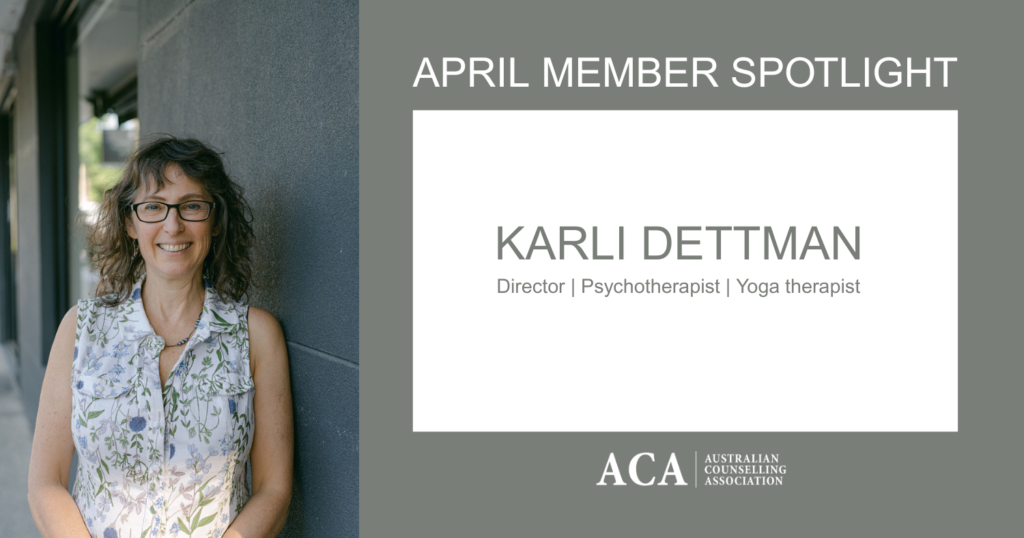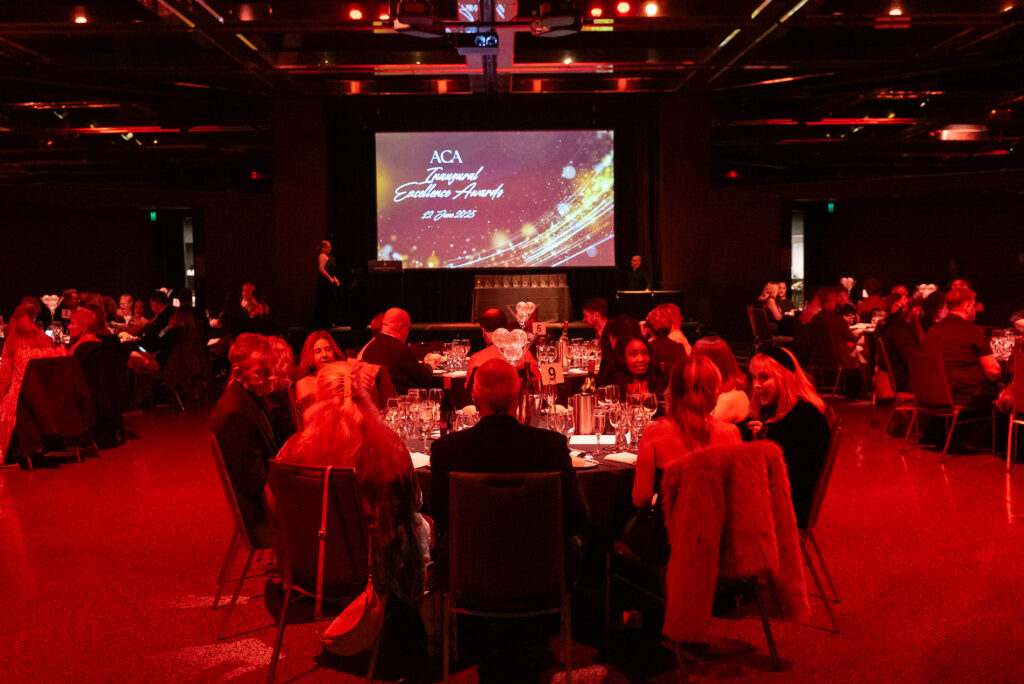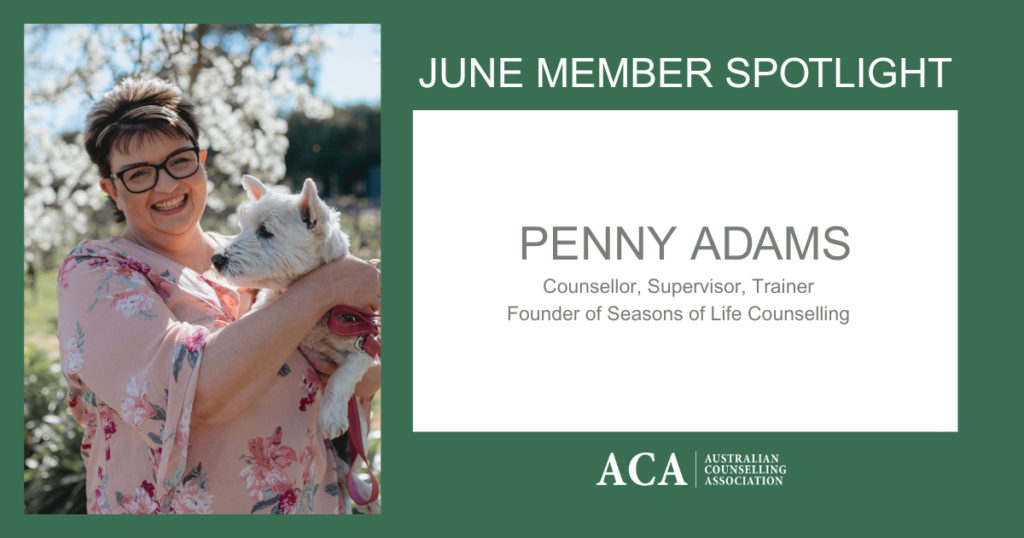Meet Karli Dettman
Each month we spotlight an ACA member in the ACA Monthly Bulletin, our monthly newsletter. The Member Spotlight is designed to showcase the work of our members to you! We hope their stories inspire or spark interest. Let’s share our experiences within our counselling community.
What motivated you to pursue a career in counselling?
When I was 23 years old, my Auslan interpreter, who looked very prim and contained at around 60 years old, suggested that I see a psychologist. She said this as I was sharing my frustrated experience in resurrecting a Deaf Theatre and boyfriend issues with her. When I said, no way, she explained she had been seeing a psychoanalyst for the past 5 years and how it has helped her. I remember I was so surprised that she saw the therapist for such a long time. But I liked her advice, so I made a quick decision to visit a nearby psychology office on Burke Street, Camberwell, Victoria. I saw an intake psychologist who was also in her 60s, a very wise woman who made me feel so relaxed that I was able to express myself well in English, however, in my Deaf voice. When I left her, I felt so much lighter, happier and relieved as if my burdens were unloaded from my shoulders.
I looked forward to meeting her again, but I was so disappointed to discover I had been allocated to see a much younger psychologist who did not understand my speech well. Often in the sessions, we struggled to understand each other well. That is when I decided to study counselling overseas so I can provide counselling in Australian Sign Language for Deaf people, their preferred language to communicate.
What specific areas do you primarily work within?
I work with C-PTSD and Deaf Trauma in Deaf and hard-of-hearing clients in one-to-one and group counselling sessions. I also direct and supervise my own business, Karli Health Centre, a specialist centre for people who are Deaf, DeafBlind and Hard of Hearing and their families. I employ 13 part time Deaf and hearing staff. As a Deaf Consultant in mental health, I present at conferences and hold workshops for hearing health professionals.
Can you share a recent success or achievement in your counselling work that you're proud of?
Running the first ever C- PTSD support group for Deaf people this year; they have learned to trust each other to share their personal stories. Deaf people usually have a difficult time to trust and to develop trusting relationships due to poor attachments with their hearing parents who do not learn to sign or embrace their child’s Deaf identity. Also, due to the lack of accessible information on mental health for Deaf people, the group is a great way for psychoeducation.
What is the most rewarding aspect of being a counsellor for you?
Having worked as a counsellor for 25 years it is very rewarding to see clients go “ah” when they have realised they have dissociation due to their neglected or abused childhood and/or experienced the 6 specific Deaf developmental barriers in the hearing society. It is common that they have no idea. Also, I have so much respect for those clients who have such high resilience to want to get help to recover and lead happy lives. Today I received a text of a picture of flowers with words “thank you” from a client who had another breakthrough in today’s session.
How do you contribute to the betterment of the profession and your community?
Due to my overseas training in America at a Deaf university, I have been able to run the first Deaf-led counselling company as well as NDIS registered Provider in Australia. I have been able to encourage our staff to be trained in Deaf Mental Health work and to be Deaf trauma trained, allowing us to provide quality, nationwide services in Australia and New Zealand. In the past, Deaf Mental Health professionals had nowhere to go for their training or supervision. Australia needed to have someone to get intensive mental health and counselling training, and so it happened it was me who went overseas for 10 years for study and training and counselling specific employment opportunities.
Are there any projects or initiatives you're currently involved in?
Yes, there are many and we are too spread thin. Right now, I am working closely with Modiule Lawson, a 3rd level psychotherapist and colleague who is advocating for our Deaf community and is the one who approached ACA late last year to work on making their website more friendly for Deaf people. She mentioned my name to ACA to go on Spotlight so a big heartfelt thanks must go to her. Currently, we are discussing another big project to organise a protest march during the International Sign language Day (23 September every year, keep this date to see us on the streets!) to stand up for our Deaf babies’ basic human rights to learn bilingually; first Auslan, and then English, with the aim to reduce lifelong mental health issues as Deaf adults, due to language deprivation. If you would like more information, do check our not-for-profit Deaf mental health website. https://deafmentalhealth.com.au
What advice would you give to someone considering a career in counselling/psychotherapy?
It is a good idea to see a counsellor to explore your own issues as well as doing some volunteer work before you consider a career in counselling/psychotherapy.
Is there a quote or philosophy that inspires your work?
Tell me and I forget, show me and I understand, teach me and I remember.
What are the barriers for Deaf people to access any mental health services?
Deaf people face many barriers accessing local MH services growing up, as many hearing professionals are not Deaf Trauma trained. Many of our Deaf and Hard of Hearing clients say the local MH community services and MH hospitals failed them and they often see us as the last resort. We do a lot of MH trauma work when Medicare psychologists should provide these services, but they are not Deaf aware, fluent in Auslan or are trained in Deaf trauma work.
Also many hearing psychologists have to book Auslan interpreters to meet Deaf clients but many interpreters are not trained in Deaf Mental Health and there are not enough interpreters around. We provide both services: Deaf trauma counselling and Auslan counseling so they don’t have to pay double fees for psychologists and interpreters. So, our NDIS services are much cheaper in the long run and fill this big need in Australia. But we are doing so much Deaf trauma work, working with their many Deaf traumas and C- PTSD from childhood developmental delays. So our services are in high demand.





